|
|
|
Sort Order |
|
|
|
Items / Page
|
|
|
|
|
|
|
| Srl | Item |
| 1 |
ID:
134365
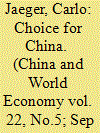

|
|
|
|
|
| Summary/Abstract |
Green growth cannot succeed without significant changes in the education system and the closely related social division of labor. This paper combines historical evidence and a game-theoretic analysis to study the relation between vocational education and green growth. It is found that a low-vocation and a high-vocation equilibrium can be distinguished in the interplay between education and labor markets, and that a high-vocation equilibrium is better suited for green growth. At the present stage of development, there are tendencies in both directions in China. Therefore, China has the possibility to successfully implement a green growth strategy by developing a strong vocational education with Chinese characteristics.
|
|
|
|
|
|
|
|
|
|
|
|
|
|
|
|
| 2 |
ID:
134367
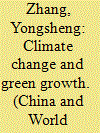

|
|
|
|
|
| Summary/Abstract |
This paper presents a new research agenda on climate change and green growth from the perspective of the division of labor in classical economics. The paper covers three major dimensions of green growth (i.e. carbon emissions, environmental protection and material resources use) and some related important topics, as well as the fresh policy implications of the new research agenda, Typical marginal analysis in a given structure of the division of labor suggests that “green” action is a burden to economic development. Therefore, climate negotiation has become a burden-sharing game and has reached a stalemate. New thinking is badly needed to rescue these negotiations and to drive a shift to a new “green growth” paradigm. The proposed new research agenda represents an effort to create a new narrative on climate change and green growth. Because the new research agenda can theoretically predict the possibility that a more competitive structure of the division of labor could be triggered by “green” policy, it has promising policy implications for various important challenges facing us in the 21st century.
|
|
|
|
|
|
|
|
|
|
|
|
|
|
|
|
| 3 |
ID:
186820
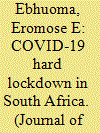

|
|
|
|
|
| Summary/Abstract |
As a result of South Africa recording its first COVID-19 index case in March 2020, the country imposed one of the strictest lockdowns globally. The lockdown unearthed vital lessons that climate practitioners both in South Africa – the largest emitter of greenhouse gases on the African continent – and globally can draw from to facilitate the achievement of the thirteenth Sustainable Development Goal (SDG 13). Drawing on secondary data analysis of media reports regarding South Africa’s strategy to tackle the ongoing COVID-19 pandemic, with particular emphasis on the hard lockdown, three themes emerged. These were rephrased to align appropriately with the discourse on climate change (CC). These include changing the distant framing narrative of CC, prioritizing green growth and utilizing credible messengers. Each theme is discussed critically in terms of how it will aid climate policy developers and practitioners in facilitating the attainment of SDG 13.
|
|
|
|
|
|
|
|
|
|
|
|
|
|
|
|
| 4 |
ID:
125640


|
|
|
|
|
| Publication |
2013.
|
| Summary/Abstract |
Project developers in South Africa are puzzled with the long process of evaluating and registering their CDM projects. In addition to other obstacles, we find that South African big businesses are rather reluctant to engage in any new business activities such as CDM projects and municipalities often lack the necessary flexibility. This offers opportunities for small-scale project developers who spot the opportunities and find creative solutions to overcome these difficulties.
|
|
|
|
|
|
|
|
|
|
|
|
|
|
|
|
| 5 |
ID:
177358


|
|
|
|
|
| Summary/Abstract |
Nepal and Bangladesh aim to reduce their greenhouse gas emissions as part of their commitments to implementing the Paris Climate Agreement and United Nations Sustainable Development Goals (SDGs). In addition, both countries are seeking to move from being categorized as low to middle-income countries. This study analyzes the empirical evidence on greening of economic growth in Nepal and Bangladesh between 1985 and 2016, and looks ahead to 2030 to discuss the future prospects in their efforts to deliver on both environmental and economic goals. To analyze their historical progress, six green growth indicators are used, and to look ahead to 2030, energy and material consumption models are used. For both countries, energy and material productivity improvements were mainly driven by structural changes in an economy, which is a transition from agricultural to service-based economies. Yet these are found to be insufficient to deliver green growth. An increase in the share of renewable energy in the energy mix and the absolute reduction of energy and material consumption in future are found to be important not only for greening the growth but also for delivering abovementioned commitments. Technological changes such as the substitution of biomass by electricity from renewable resources can be a part of sustainable strategy for reconciling the climate mitigation actions with graduation to the middle-income country category.
|
|
|
|
|
|
|
|
|
|
|
|
|
|
|
|
| 6 |
ID:
110400
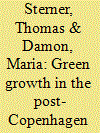

|
|
|
|
|
| Publication |
2011.
|
| Summary/Abstract |
Global climate change stands out from most environmental problems because it will span generations and force us to think in new ways about intergenerational fairness. It involves the delicate problem of complex coordination between countries on a truly global scale. As long as fossil fuels are too cheap, climate change policy will engage all major economies. The costs are high enough to make efficiency a priority, which means striving toward a single market for carbon-plus tackling the thorny issues of fairness.
Hopes for a grand deal were mercilessly shattered at Copenhagen in December 2009 and in other recent UNFCCC meetings, with the result that "green growth" is promoted as an alternative path. Indeed, green growth is clearly the goal, but it is no magic bullet. The world economy will require clear and rather tough policy instruments for growth to be green-and it is naïve to think otherwise. Growth, green or not, will boost demand for energy and coal is normally the cheapest source. The magnitude of the challenge is greater if we also consider the problems related to nuclear (fission) energy and, in some instances, to bioenergy (such as its competition for land that may be essential for the poor). This paper discusses some necessary ingredients for a long-term global climate strategy. As we wait for the final (and maybe elusive) worldwide treaty, we must find a policy that makes sense and is not only compatible with, but facilitates the development of such a treaty.
|
|
|
|
|
|
|
|
|
|
|
|
|
|
|
|
| 7 |
ID:
176121


|
|
|
|
|
| Summary/Abstract |
The green development of free trade zones conforms to the theoretical principles of sustainable development and is key to promoting regional transformation and upgrading. By using synthetic control methods (SCM) based on microscopic data, this paper investigates the net effect of the establishment of the China (Shanghai) pilot free trade zone (SPFTZ) on green total factor productivity (GTFP) in Shanghai. The results show that the SPFTZ has promoted the GTFP in Shanghai. As far as time trend is concerned, the effects of this promotion become more apparent after a short-term period of slow growth. In terms of impact paths, the main driving force of policy is technological progress. Therefore, the SPFTZ should improve GTFP and create greater incentives for technological innovation. Institutional innovation for green development should play a central guiding role in the construction. We need continue to explore other green development models as well as means of creating higher levels of economic openness.
|
|
|
|
|
|
|
|
|
|
|
|
|
|
|
|
| 8 |
ID:
162954
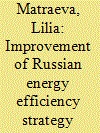

|
|
|
|
|
| Summary/Abstract |
Analysis of Russian energy saving potential and experience of implementation of energy efficiency policy in Russia at the present stage showed that the domestic economy has considerable potential energy savings, but their implementation requires intensifying the activities of the State in this area, particularly with regard to overcoming the identified reasons for the low efficiency of national economy. Government activities in the field of energy saving and energy efficiency in Russia was initiated in 2008 and a significant legal and regulatory framework was developed as a basis for it, however, despite the positive examples, the objectives set for energy intensity reduction are not being met, and the overall level of implementation of government interventions in energy efficiency in industries is insufficient. This paper proposes the author's approach to Russian energy efficiency strategy, which, based on international experience, sets out priorities for improving the energy efficiency policies.
|
|
|
|
|
|
|
|
|
|
|
|
|
|
|
|
| 9 |
ID:
147573


|
|
|
|
|
| Summary/Abstract |
In the field of global environmental governance South Korea stands out. Since 2005 it has been the initiator and central node in a majority of international networks and organizations promoting green growth. Based on new theoretical approaches and empirical analysis, this article highlights the significance of Korea's middle power diplomacy in relation to green growth governance, establishing it as a ‘Green Middle Power.’ Middle power analyses of Korea usually portray it as a regionally constrained and secondary actor in global governance. This article supplements middle power theory's behavioral approach with a strategic action approach inspired by Bourdieu's practice theory, which it applies to an original database of >1,000 sources, 18 interviews, and 10 participatory observations. The article argues that Korea has become a primary actor in global environmental governance by demonstrating how Korea has established a sub-field of green growth governance through a wide range of strategic moves.
|
|
|
|
|
|
|
|
|
|
|
|
|
|
|
|
| 10 |
ID:
141148


|
|
|
|
|
| Summary/Abstract |
After a brief introduction of the existing literature on environmental pioneer states and their internal characteristics, this study examines various low-carbon green growth (LCGG) initiatives that the South Korean government introduced to market Korea as a trendsetter in the global environmental arena. The country's domestic foundations for environmental innovation, however, reveals a dissonance between its international aspirations and the internal conditions that are needed to sustain the pursuit. This case of mixed environmental achievements by a rising middle-power state suggests the insufficiency of a state-led approach to environmental innovation and leadership.
|
|
|
|
|
|
|
|
|
|
|
|
|
|
|
|
| 11 |
ID:
171389


|
|
|
|
|
| Summary/Abstract |
Integrated Assessment Models provide a framework to study sustainability transitions and their economic impacts. Models seldom consider energy constraints, taking supply availability for granted and thus suggesting a mere change in the energy mix from non-renewables to renewables. In order to address these limitations, a macro-economic module within a broader system dynamics model (MEDEAS) has been developed. The model has been run for the whole world from 1995 to 2050 under three different scenarios: Business as Usual (BAU), considering no further transition policies and keeping current trends; Green Growth (GG), undertaking the low-carbon transition according to the Paris Agreement set of policies and with high GDP growth standards; and Post-Growth (PG), testing the sustainability transition under a GDP non-growth/degrowth approach. The results reveal the conflict between economic growth, climate policy and the sustainability of resources. Whereas a BAU approach would not even be an option to achieve climate goals, a GG view would not only face the downsizing of economic output, but neither would it be able to achieve the 2 °C objective. The success of the PG approach in meeting emissions objectives suggests a redirection from economic growth policies to an industrial policy that incorporates efficiency and redistribution.
|
|
|
|
|
|
|
|
|
|
|
|
|
|
|
|
| 12 |
ID:
176887
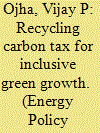

|
|
|
|
|
| Summary/Abstract |
In this decade, India has been pursuing a low carbon inclusive growth strategy. However, carbon tax, the most direct price instrument to reduce carbon emissions, has not found favour with policymakers because of its supposed detrimental effects on economic growth and income distribution. In the Indian context, the literature indicates that though carbon tax is extremely effective in abating carbon emissions, it simultaneously leads to reductions in GDP. There is, thus, an undesirable trade-off between economic growth and climate change mitigation. However, in trying to overcome this trade-off through a double-dividend from carbon tax, these studies have not really explored all possible options. Whether the carbon tax will yield a double-dividend or not, will depend upon how the carbon tax revenue is recycled.
|
|
|
|
|
|
|
|
|
|
|
|
|
|
|
|
| 13 |
ID:
167016


|
|
|
|
|
| Summary/Abstract |
The paper investigates the dynamic relationship between renewable energy usage and trade performance in sub-Saharan Africa (SSA), while considering the conditioning role of corruption control, regulatory quality, and the private sector access to finance. Focusing on 42 SSA countries for the period 2004–2016, and engaging the System generalized method of moments (GMM) technique for its estimation, this study found a negative relationship between renewable energy usage and the indicators of trade performance. However, with corruption control, improved regulatory framework, and better finance for the private sector, there are potentials for a positive net impact of renewable energy usage on manufacturing export. For renewable energy and total trade nexus, we find that improved regulatory framework, and better finance for the private sector are important conditioning structures. These findings are significant because they highlight the different important structures of SSA countries that improves the effect of renewable energy use on trade outcomes. For instance, the consideration of the financial, institutional and regulatory frameworks in SSA countries in conditioning the renewable energy-trade nexus stipulates a clear policy pathway for countries in this region as the debate for transition to the use of renewable energy progresses.
|
|
|
|
|
|
|
|
|
|
|
|
|
|
|
|
| 14 |
ID:
134366


|
|
|
|
|
| Summary/Abstract |
The current model of economic growth generated unprecedented increases in human wealth and prosperity during the 19th and 20th centuries. The main mechanisms have been the rapid pace of technological and social innovation, human capital accumulation, and the conversion of resources and natural capital into more valuable forms of produced capital. However, there is evidence emerging that this model may be approaching environmental limits and planetary boundaries, and that the conversion of natural capital needs to slow down rapidly and then be reversed. Some commentators have asserted that in order for this to occur, we will need to stop growing altogether and, instead, seek prosperity without growth. Others argue that environmental concerns are low-priority luxuries to be contemplated once global growth has properly returned to levels observed prior to the 2008 financial crisis. A third group argues that there is no trade-off, and, instead, promotes green growth: the (politically appealing) idea is that we can simultaneously grow and address our environmental problems. This paper provides a critical perspective on this debate and suggests that a substantial research agenda is required to come to grips with these challenges. One place to start is with the relevant metrics: measures of per-capita wealth, and, eventually, quantitative measures of prosperity, alongside a dashboard of other sustainability indicators. A public and political focus on wealth (a stock), and its annual changes, could realistically complement the current focus on market-based gross output as measured by GDP (a flow). This could have important policy implications, but deeper changes to governance and business models will be required.
|
|
|
|
|
|
|
|
|
|
|
|
|
|
|
|
| 15 |
ID:
127534


|
|
|
| 16 |
ID:
120951
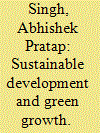

|
|
|
| 17 |
ID:
115101
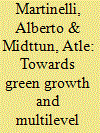

|
|
|
| 18 |
ID:
120942
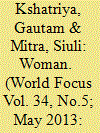

|
|
|
|
|
|
|
|